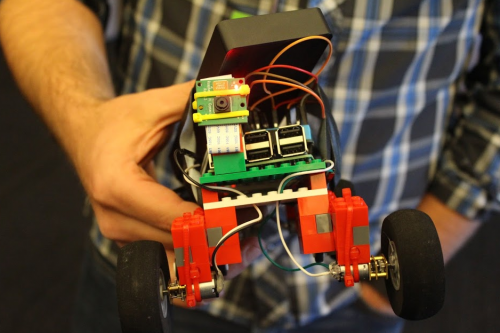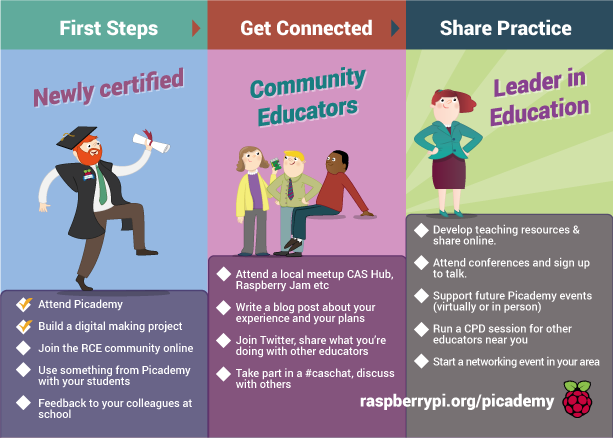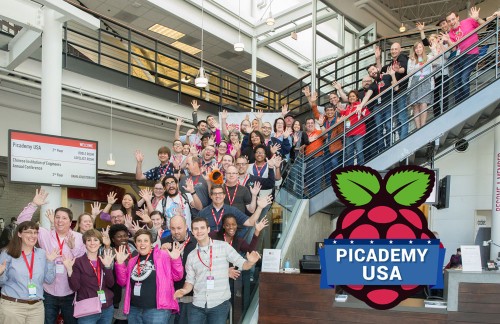Post Syndicated from Carrie Anne Philbin original https://www.raspberrypi.org/blog/picademy-questions-answered/
In April 2014 we ran our first ever training event for teachers. We called it ‘Picademy‘, and we selected 24 fabulous teachers to attend and gave them a qualification and a very special badge at the end.
Our aim was to give teachers the skills and knowledge they need to get creative with computing, no matter what their level of experience.

Educators teach, learn and make with us at Picademy
Two years on, there are now over 700 Raspberry Pi Certified Educators around the world working with tens of thousands of young people. We know that many of our Certified Educators have gone on to become leaders in the field, helping to train other educators and build a movement around computing and digital making in the classroom.
Based on the huge volume of questions and enquiries we get from people who want to get involved in Picademy, we think we’re onto something, and we’re developing some exciting plans for the future. For now, I wanted to answer some of the most commonly asked questions about Picademy.
What is Picademy?
Picademy
Picademy offers teachers two full days of hands-on Continued Professional Development (CPD) workshops, and attendees become Raspberry Pi Certified Educators. It’s free, and our friends at Google are supporting us to offer it at their Digital Garage venues around the UK. Watch the experiences of attendees at Picademy@Google in Leeds, then find out more and apply at rpf.io/train.
Picademy is a two-day course that allows educators to experience what can be achieved with a little help and lots of imagination. Through a series of workshops we introduce a range of engaging ways to deliver computing in classrooms all over the world. Highlights include using physical computing to control electronic components like LEDs and buttons; coding music with Sonic Pi; and terraforming the world of Minecraft. On day two, attendees have the opportunity to apply their learning by developing their own project ideas, learning from each other and our experts.
Each cohort that attends contains a mix of primary, secondary and Post-16 educators representing many different subject areas. One of our aims is to create leaders in education who are equipped with skills to train others in their community. Attending our training is the first step in that journey.

When are you bringing Picademy to [insert name of place here]?
This is by far the most common question. There is clearly a huge demand for the kind of professional development that Picademy offers.
So far, we’ve been mainly focused on the UK. The first wave of events were held at Pi Towers in Cambridge. Over the past year, thanks to the generous support of our friends at Google, we have been able to bring Picademy to cities across the UK, with events in Leeds, Birmingham and Manchester. In the next few months, we will be running events in Newcastle, Liverpool and London. The venues are part of the Google Digital Garage initiative, and we’ll be running Picademy sessions with them until at least April 2017, so we hope to pop up in a city near you soon!
This year, we launched a pilot programme in the USA, with our first ever Picademy training events outside the UK taking place in California in February and April before heading to Baltimore in August.
We don’t currently have plans to launch Picademy in other parts of the world. We’d love to, but we just don’t have the capacity. We are brainstorming ideas for how the Foundation can better support educators globally and as those ideas develop, we’ll be looking for your input to help shape them.
We often get asked whether we will partner with organisations in other parts of the world who want to run Picademy on our behalf. We aren’t currently considering those kind of partnerships, but it is one of the options that we will be looking at for the long-term.
I’m not a teacher, but I want to learn about Raspberry Pi. Can I attend?
Picademy is designed for teachers. The aim is to equip them with the best possible pedagogy, strategies, tools and ideas to bring digital making into the classroom. It’s also about building a community of educators who can support each other and grow the movement.
It’s not a “How to use Raspberry Pi” course. There are lots of websites and video channels that are already doing a fantastic job in that space (see our Community page for a small selection of these).
We know that there are lots of people who aren’t formal teachers who help young people learn about computing and digital making, and we are working hard to support them. For example, we have a huge programme of training for Code Club volunteers.
For Picademy, our priority is to support the people at the chalkface, where access to professional development is problematic and where up-skilling in digital making is needed most.

The first Picademy USA Cohort – our largest ever, totalling 40! © Douglas Fairbairn Photography / Courtesy of the Computer History Museum
We have accepted applications from people in other roles, like teaching assistants and librarians, who work with children every day in schools or other community settings, but the vast majority of participants have been qualified, serving teachers.
If you want to learn about Raspberry Pi, one of the best places to start is a Raspberry Jam. There are now hundreds of Jams happening regularly around the world. These are community events, run by brilliantly talented volunteers, that bring together people of all ages to learn about digital making.
Can I have access to the course materials?
All our Picademy sessions are based on resources that are available for free on our website. Some of the most common sessions are based on:
- Getting started with Physical Computing in both Scratch and Python
- Sonic Pi Lessons
- Getting started with Minecraft Pi
- Getting started with the Raspberry Pi camera
- Spinning flower wheel
- Sense HAT pixel pet
Our focus is on collaboration, making, project-based learning, and computing – similar to most Raspberry Jams, in fact. If you are super-interested in STEAM, project-based learning, and digital making (the pillars of Picademy), then I’d recommend the following reading as a starting point:
- Young Digital Makers Report by Oliver Quinlan
- Mindstorms by Seymour Papert
- Invent to Learn by Sylvia Libow Martinez & Gary Stager
The materials and reading is part of the recipe of a successful Picademy. What’s harder to share is the energy and atmosphere that is created.
Miss Grady on Twitter
Using code we have created a funfair! All components triggered by #Python codes we have written ourselves #picademypic.twitter.com/J5spWvoQom
Our trainers all have experience of teaching in formal contexts, have good subject knowledge and a super-supportive manner. They share their expertise and passion with others which is inspiring and infectious. The educators that attend are open-minded, imaginative and curious. Together we have a lot of fun.
Who can I speak to about Picademy?
The teacher training team at the Foundation consists of three full time people: Picademy Manager James Robinson, Code Club Teacher Training Manager Lauren Hyams, and Education Team Co-ordinator Dan Fisher. Do reach out to us via the forum or social media.
We’re supported from across the Foundation and our wider community by an awesome team that helps us design and deliver the events.
Without the support of all these people, we would not be able to run the volume of events that we do – a huge thank you with bells on to all our helpers from me!
The post Your Picademy questions answered appeared first on Raspberry Pi.